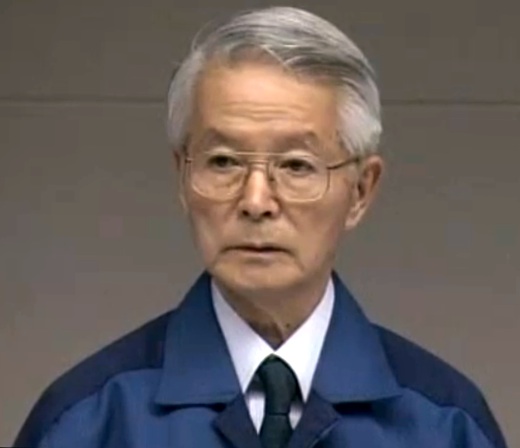SUBHEAD:It was not until July 22 that TEPCO revealed the truth about massive radioactive leaking into Pacific.
Highlighted Korea Times content on 12 August 2013 in ENE News -
(http://enenews.com/korea-times-quarter-billion-liters-of-contaminated-water-has-flowed-into-pacific-from-fukushima-japan-cover-up-could-violate-international-law-hid-global-issue-of-environmental-concern)

Image above: Tepco Chairman Tsunehisa Katsumata apologizing to the Japanese people for the Fukushima nuclear disaster in March 2011, From (http://www.bbc.co.uk/news/world-asia-pacific-12903725).
The Japanese government has finally acknowledged that highly radioactive water has been pouring out at a rate of 300 tons a day from the crippled Fukushima nuclear plant. That means about 270,000 tons [270,000,000 liters] of contaminated water has flowed into the Pacific Ocean over nearly two-and-a-half years. [...]
It defies understanding how Japan has hid this regional, if not global, issue of environmental concern from its neighbors.
Increasingly, the March 2011 nuclear disaster is becoming an accident that exposes the limitations of the Japanese nuclear industry, and of the entire country for that matter, in dealing with a massive calamity. This seems especially so with the falsehoods and cover-up attempts [...]
[Korea's] Prime Minister Chung Hong-won, in a recent meeting to discuss the aftermath of the Fukushima Daiichi Plant’s shutdown, warned people against spreading “strange stories” about nuclear concerns. As Tokyo’s latest acknowledgement shows, however, what’s strange is not public jitters but the government’s carelessness.
[...] The government should instead demand its Japanese counterpart to share information, pointing out that Tokyo’s failure to do so could violate international laws. It also ought to inspect all fisheries imported from Japan and make public their detailed level of radioactivity to allow consumers to decide [...]
.
Highlighted Korea Times content on 12 August 2013 in ENE News -
(http://enenews.com/korea-times-quarter-billion-liters-of-contaminated-water-has-flowed-into-pacific-from-fukushima-japan-cover-up-could-violate-international-law-hid-global-issue-of-environmental-concern)

Image above: Tepco Chairman Tsunehisa Katsumata apologizing to the Japanese people for the Fukushima nuclear disaster in March 2011, From (http://www.bbc.co.uk/news/world-asia-pacific-12903725).
It was not until July 22, right after Japan’s upper-house elections, that the ill-fated plant’s operator, TEPCO, revealed the truth. And the Japanese government is belatedly moving to reflect the expense of shutting off the water spill on next year’s budget.Content below: Highlighted parts of Korea Times Editorial (behind paid subscription) selected by ENE News.
From the editorial 12 August 2013 in the Korea Times owned by YonHapNews Agency. (http://english.yonhapnews.co.kr/news/2013/08/12/0200000000AEN20130812000300315.html)
The Japanese government has finally acknowledged that highly radioactive water has been pouring out at a rate of 300 tons a day from the crippled Fukushima nuclear plant. That means about 270,000 tons [270,000,000 liters] of contaminated water has flowed into the Pacific Ocean over nearly two-and-a-half years. [...]
It defies understanding how Japan has hid this regional, if not global, issue of environmental concern from its neighbors.
Increasingly, the March 2011 nuclear disaster is becoming an accident that exposes the limitations of the Japanese nuclear industry, and of the entire country for that matter, in dealing with a massive calamity. This seems especially so with the falsehoods and cover-up attempts [...]
[Korea's] Prime Minister Chung Hong-won, in a recent meeting to discuss the aftermath of the Fukushima Daiichi Plant’s shutdown, warned people against spreading “strange stories” about nuclear concerns. As Tokyo’s latest acknowledgement shows, however, what’s strange is not public jitters but the government’s carelessness.
[...] The government should instead demand its Japanese counterpart to share information, pointing out that Tokyo’s failure to do so could violate international laws. It also ought to inspect all fisheries imported from Japan and make public their detailed level of radioactivity to allow consumers to decide [...]
.
No comments :
Post a Comment